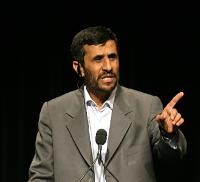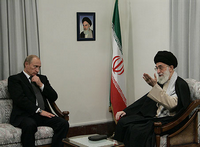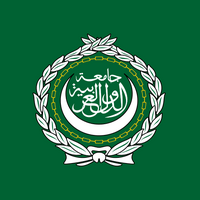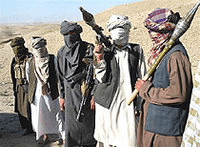It’s probably reductionist, simplistic and uninformed of me, but I’ve long considered that the biggest source of cultural misunderstanding between the West and the Islamic World was their fundamental disagreement over the role of women in society. Not that there is any monolithic, uniform opinion on either side of the debate. But for me, modernism culminates in — if it doesn’t quite boil down to — the liberation of women from biologically determined social roles. But if the Islamic World has embraced almost all other aspects of modernism — after all, what’s more modern than uranium enrichment? — the sticking […]
Iran Archive
Free Newsletter
There was some suggestion following the IAEA’s Iran report last week that Iran might have made a political decision to not expand its enrichment capacity as quickly as it might have. The argument centered around roughly 1500 new centrifuges that had been installed but not yet put into operation. But in yet another essential ACW post, Jeffrey Lewis presents a compelling case for why the centrifuges might be evidence of an acceleration in, or at least a maturation of, Iran’s enrichment pace. Essentially, Lewis argues that Iran’s halting, small-batch installation process in the past reflected its lack of expertise. Now […]
Interesting that Dennis Ross has been named special advisor, reporting exclusively to Secretary of State Hillary Clinton, while Richard Holbrooke and George Mitchell were both named special presidential envoys, reporting both to Clinton and President Barack Obama. I would have thought that Obama would like to keep as close an eye on the Iran dossier as on the others. At first glance Ross’ official title, “adviser to the secretary of state for the Gulf and Southwest Asia,” reminded me of Jon Alterman’s WPR Briefing, The Middle East Moves East. Alterman suggested that the Obama administration’s regional approach would redraw the […]
I’ve been meaning to flag this James Acton post at Arms Control Wonk, a site that is always fascinating but that becomes essential reading in the days after any IAEA Iran report. Acton discusses the discrepancy between the amount of enriched uranium estimated over the course of the year by Iran and what the IAEA actually found in its annual measurement verification. Some have interpreted the estimates, which were about a third lower than what the IAEA measured, as evidence of Iranian deviousness. But Acton makes it clear that it could, in fact, be something worse: The fact that Iran […]
The IAEA just released its latest report on Iran’s nuclear program(available here for download as a .pdf file via ACW), and if the past is anyindication, expect the accompanying spin and analysis to be a bitmisleading. To unpack the actual report, essentially the IAEAdetermined that Iran had continued running the centrifuges it alreadyhad online and had added some more, and that the efficiency of thecentrifuges already online had improved. The Iranians, meanwhile, onceagain refused to allow the more rigorous and transparent inspectionsmandated by the Additional Protocol, used a loophole to deny inspectorsaccess to a heavy water reactor under construction but […]
In the post-Iraq War Middle East, everything is regional and all roads lead to Tehran. Here’s Laura Rozen on George Mitchell’s debriefing to American Jewish “community leaders”: Mitchell said that on the plane back from his recent trip to the MiddleEast, he had re-read his eight-year-old report on thePalestinian-Israeli conflict, and was struck by how much the situationhad changed. Among the changes he noted, Mitchell said that eight yearsago, no one talked about Iran. But this time, everyone mentioned it,both Israeli and Arab leaders. What’s interesting is the way the Iran bogeyman, whether real or imagined, is reshaping everyone’s strategic […]
The IAEA just released its latest report on Iran’s nuclear program (available here for download as a .pdf file via Arms Control Wonk), and if the past is any indication, expect the accompanying spin and analysis to be a bit misleading. According to the actual report, the IAEA essentially determined that Iran has continued running the centrifuges it already has online and has added some more, and that the efficiency of the centrifuges already online has improved. The Iranians, meanwhile, once again refused to allow the more rigorous and transparent inspections mandated by the Additional Protocol, used a loophole to […]
The interesting thing about walking back our objectives (and/or additional troop deployments) in Afghanistan is that it instantly reduces our need for Russia’s help. Add to that an (admittedly still theoretical) warming of relations with Iran, and you’ve got further lightening of need for Russian support (on the nuclear standoff), as well as a diversified energy source for Europe. There are still plenty of areas where our interests overlap with Russia’s, and it seems silly to needlessly antagonize Moscow, especially if it’s to cultivate alliances with unreliable and/or unstable states like Georgia and Ukraine, or to deploy unproven and not […]
Good thing I complained to Hampton earlier about finding absolutely nothing interesting to write about today. He sent word that DNI Adm. Dennis Blair is testifying before the Senate Select Committee for Intelligence today, and attached his testimony (.pdf). As I flipped through it, I couldn’t help but feel like I’d read the passages on pp. 19-20 (i.e., the parts about Iran’s uranium enrichment and weaponization programs) somewhere before. And it turns out I had, because the entire bit is pretty much a word for word copy-and-paste from the 2007 Iran NIE. The very same 2007 Iran NIE that, according […]
After Obama, Khatami? Not so fast, says Geoffrey Kemp writing at the National Interest: Khatami represents the smiling face of Iranian reformers. He is knownas a “moderate,” primarily because he has a more lax attitude towardssocial issues, such as women’s dress. But on the fundamentals of theIranian Revolution he is a hard-liner. . . . . . . There is no indication at this point that the nuclear program will slowdown under a Khatami presidency. Those who welcome the announcement ofhis candidacy are correct that it will lead to an exciting presidentialrace. But those who think it will change the […]
When I first read the transcript of Vice President Biden’s remarks in Munich over the weekend, I couldn’t help but think the language with regard to Russia sounded remarkably similar to that of the Bush administration (prior to the Georgia War, anyway). So I was a bit surprised to see the Russians respond so warmly to it. Apparently, “press the reset button” translates better into Russian than “sovereign states have the right to make their own decisions and choose their own alliances” or “we will continue to develop missile defense to counter the growingIranian capability, provided the technology is proven […]
A funny thing happened over the weekend, besides me getting knocked for a loop by a bad chest cold. Friday it seemed as if the Obama honeymoon was over. The Iranians were lobbing satellites into space, the North Koreans were trucking ICBMs cross-country, Russia was strong-arming Kyrgyzstan into shuttering our air base, and the Republicans were doing the bipartisanship approach to economic stimulus like Tyson did Marvis Frazier. Now it looks like the Russians love us again, the Iranians are willing to talk, Kyrgyzstan is willing to deal, and the big winner on economic stimulus is Obama. Anyone got a […]

In a television interview in late January with the Arab network Al Arabiya, President Barack Obama raised the issue of talks with Iran as part of a public diplomacy campaign directed towards the Middle East and Islamic worlds. Obama has a huge task ahead of him should he attempt to break the 30-year American-Iranian deadlock, but the payoff could be significant. While such a breakthrough won’t solve all the problems in the Middle East, rapprochement between the U.S. and Iran has the potential to positively impact on the precarious situations in Iraq and Afghanistan, as well as on the security […]

On Feb. 2, Iran launched its first wholly indigenous satellite, the Omid, from a two- or possibly three-stage liquid-fuel Safir missile launcher. Assessments of the launch by European, Israeli, and American experts concurred that it raises the specter of Iran having a usable ballistic missile capability with which it can eventually launch the nuclear weapons that they and their governments fear Iran is building. Specifically, they believe that Iran can now target Europe with its missiles. Neither are they alone in the belief. Vitaly Lopota, president of Russia’s Energiya Corporation, congratulated Iran for having missiles capable of reaching any spot […]

The idea of a single, united “Arab World” has never moved very far beyond the realm of wishful thinking. The history of the Middle East comes filled with countless chapters on intra-Arab warfare and numerous tomes on political enmity and intrigue pitting Arab states against each other. From the earliest days of Islam, when the Sunni-Shiite divide tore the believers apart, to the late 20th century, when conflicts such as the Iraqi invasion of Kuwait and subsequent U.S.-led counterattack divided Arab loyalties, unity has proven elusive. At times, it was possible to downplay the split. Now, however, all pretenses have […]

America may not be losing the war in Afghanistan, but it is also not winning. Neither is the U.S. approach in neighboring Pakistan making friends or preventing new recruits from crossing the border to kill U.S. and other NATO troops. What then is the best way to promote peace and security in the greater South Asia region, home to nearly half the world’s population and several nuclear-armed states? The challenges involved in confronting these threats — which means fighting extremism in both countries, rebuilding governance in Afghanistan, and supporting a weak democratic government in Pakistan — dwarf the past two […]
